Would You Make It onto Donald Trump’s Jury? Experts Identify the Ideal Juror — and What They’ll Be Asked
- Oops!Something went wrong.Please try again later.
More than 500 New Yorkers are being summoned to a Manhattan courthouse to kick off the historic jury selection process in Trump's first criminal trial. Here's how it'll work
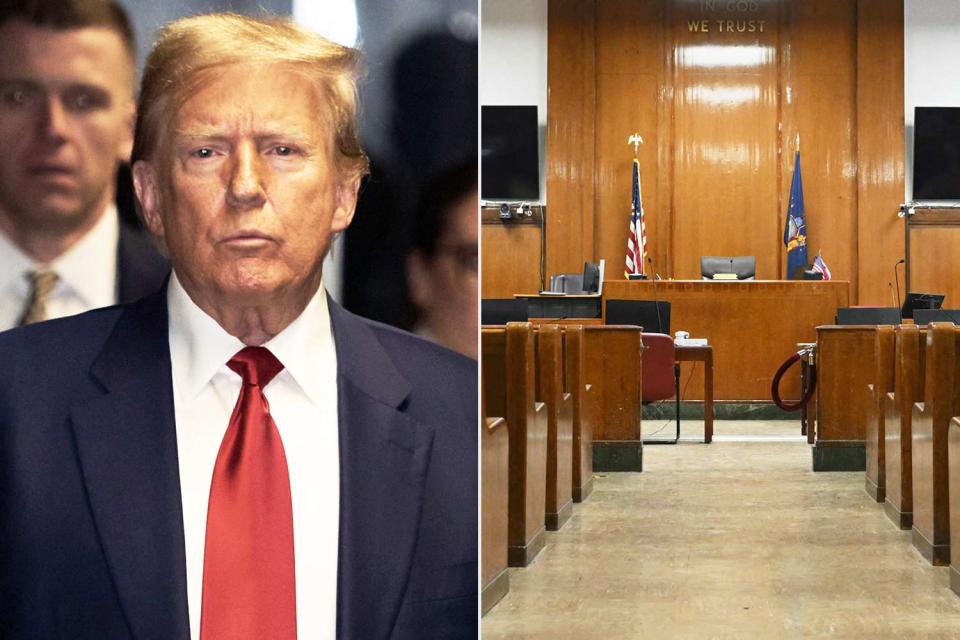
Curtis Means-Pool/Getty; Angela Weiss/AFP/Getty
Jury selection begins in Donald Trump's Manhattan hush money trial on Monday, April 15Jury selection in Donald Trump's hush money trial is about to begin, which begs the question: Is anyone impartial enough to be seated as a juror in a high-profile case against a former president?
On Monday, April 15, New York Judge Juan Merchan will learn the answer, when more than 500 randomly summoned Manhattan residents are expected in court to audition for the part.
Out of several hundred candidates, the court only needs to identify 18 people who seem capable of judging Trump fairly. The most trusted 12 will comprise the jury, and six additional people will sit in on the trial as alternates.
"I don't think asking 500 eligible jurors to report for selection is outrageous"
Criminal defense attorney Caroline Polisi
To whittle the jury pool down to its finalists, prosecutors, defense attorneys and the judge will have to work together to eliminate jury candidates one by one until only 18 remain. While potential jurors answer a series of screening questions, the Manhattan DA's office and Trump's legal team will be listening for clues about their biases and strategically trying to keep people in the running who are likely to swing in their respective directions.
"There is an entire cottage industry of jury consultants, and you can bet Trump has paid for the best," explains Caroline Polisi, a white-collar criminal defense attorney known for breaking down high-profile cases. "His team likely ran focus groups and even mock trials in order to identify the exact mix of character traits they are looking for in a juror, and that goes well beyond the obvious ones like race, age, gender and political affiliation."
If you're curious about whether you'd make it through the rigorous vetting process, you're not alone. Here's how the potential hush money trial jurors will be screened in the coming days, to give you an idea of whether you'd qualify.
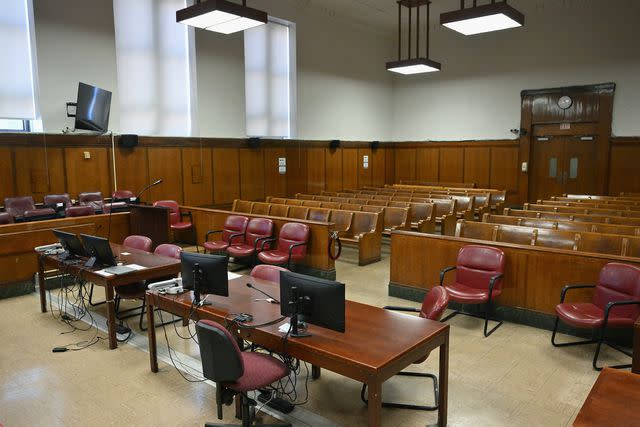
ANGELA WEISS/AFP via Getty
New York Judge Juan Merchan's Manhattan courtroom, where Donald Trump is expected to go on trial in AprilThe Initial Excusals
Almost immediately, a portion of the people summoned for jury duty will be dismissed at their own will. After Judge Merchan reveals the defendant and his charges, names the witnesses who are expected to testify and details his expectations for the jury — including that it'll be a six-week gig — he will ask people to raise their hands if they believe they cannot fulfill the duties of a juror.
"If you have an honest, legitimate and good faith reason to believe that you cannot serve on this case, or that you cannot be fair and impartial, based solely upon what you have heard up to this point, please let me know now," Merchan plans to say.
He will then have anyone who raises their hand line up in front of the bench and individually explain their reasoning for wanting to leave, and he expects to grant most of their requests.
Related: Everyone Who Might Testify in Donald Trump's Hush Money Trial, Which Begins April 15
"Given the high-profile nature of this case, I don't think asking 500 eligible jurors to report for selection is outrageous," Polisi tells PEOPLE, explaining that "there will be many jurors dismissed for mundane reasons like the resulting undue hardship they would endure from being away from work for an extended period, or the inability to serve because they are the only caretaker to a dependent."
And if you're not interested in even trying to put your bias aside, this is where you'd want to throw in the towel and get some of your Monday back.
Related: Stormy Daniels Speaks Out After Trump's Hush Money Indictment amid Fears for Her Safety
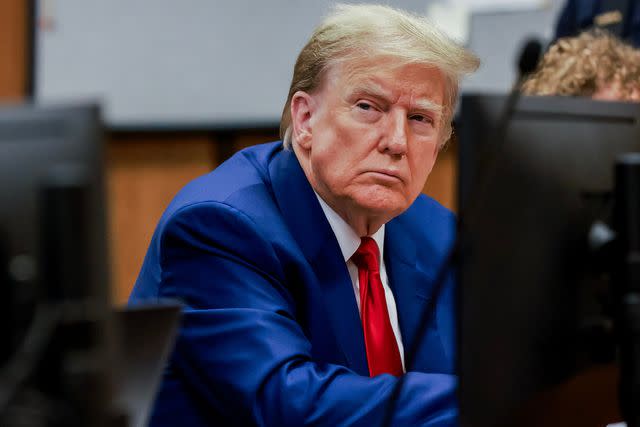
Justin Lane/EPA/Bloomberg via Getty
Donald Trump attends a pre-trial hearing at Manhattan Criminal Court on March 25, 2024Get Ready to Tell Your Life Story
Once the first batch of people are excused, jurors will take turns verbally answering a series of 42 personal questions that have already been approved by Judge Merchan. The screening questions for Trump's hush money trial were previously debated by Manhattan prosecutors and the defense counsel.
Potential jurors may go into the selection process thinking they can skirt the system by hiding their predispositions, which has certainly happened in trials before and poses a risk of getting an unfair verdict. The questionnaire phase is designed to avoid that, asking all sorts of things that force each candidate to go on the record about their personal life, their family background, their social circles and their level of involvement in politics.
The questionnaire also asks, in a number of ways, whether jurors believe they are capable of making fair decisions in spite of their personal feelings, ending with the point-blank question: Is there any reason, whether it be a bias or something else, that would prevent you from being fair and impartial if you are selected as a juror for this case?
"There is no juror that hasn't heard of Trump, but that is not the test," Polisi explains of the questioning process, known in the legal profession as voir dire. "The requirement is that regardless of political affiliation, can you put those personal feelings aside and view the evidence impartially and make a decision based solely on the facts and the law presented to you?"
What Exactly Does the Questionnaire Ask?
So you say you're prepared to treat Trump like any other defendant and focus on the facts. But does the court believe you? Simply telling the professionals in the room that you're mature enough to handle the weight of Trump's fate doesn't mean you aced the test. There are 42 questions you have to nail, remember?
"Your run of the mill, typical criminal case might have 35 to 40 jurors summoned to court," says David Ring, a trial attorney who represented Jane Doe 1 in the similarly high-profile Harvey Weinstein case. Trump needs so many more, he tells PEOPLE, because of how many will fail the voir dire process.
"The court realizes that there will be many potential jurors who are biased one way or another, for or against the case, and [they] will be quickly dismissed as potential jurors," Ring adds.
Related: Who Is Karen McDougal? All About the Former Playboy Model Tied to Donald Trump's Indictment
In a recent court filing, Judge Merchan released the full list of questions that jury candidates will be asked to respond to early on in the process, and it's apparent that — unless people flat-out lie — they will be effective in revealing the most relevant biases. Fortunately, nobody will need to use their name when answering, as that information is being heavily guarded given the inflammatory nature of the case.
Below is a shortened (and paraphrased) version of what you'd be asked to answer aloud if you were in this jury pool.
Jury Questionnaire Highlights
Where do you work and what do you do?
What's your residency history?
What does your free time look like?
Do you have health issues or take disruptive medications?
Will your religion impact your jury service?
What media outlets do you follow?
What social media platforms are you on?
Have you engaged with Trump's campaigns or businesses?
Have you supported or followed any anti-Trump movements?
Do you support Antifa, QAnon, Proud Boys, etc.?
Do you think presidents should be criminally charged?
Is Trump being treated fairly?
Have you read any of Trump's books?
Are you familiar with Michael Cohen's books and podcasts?
How do you feel about laws surrounding political contributions?
Does anyone in your life work in law enforcement?
Does anyone in your life work in accounting or finance?
Does anyone in your life have legal experience?
Has anyone in your life worked for any level of government?
Has anyone in your life been a victim of a crime?
Has anyone in your life been in trouble with the law?
Can we trust you to not screw this up?
Some questions provide an obvious window into your mindset — like whether you've rioted with the Proud Boys, been accused of a financial crime or exclusively read Huffington Post.
Other answers in the questionnaire could offer more subtle clues into your thinking, like if you stated that you live in the ultra-liberal Chelsea neighborhood, divulged the details of your niece's 2012 arrest or shared that your friend recently graduated law school. Through those answers, the prosecutors and defense attorneys can paint a collective picture of who and what might influence your perspective on the case.
If you reveal a direct connection to an involved party or hint at some sort of strongly held belief that would cloud your judgment too much, an attorney on either side can ask the judge to dismiss you "for cause." That's the primary way people are sent home, and it can happen early on or during follow-up questioning, once someone has revealed enough bias for the judge to get on board.
Related: All About Todd Blanche, Donald Trump's Attorney in Ongoing Criminal Cases
"Each side will tell you that their ideal juror is someone who can view the evidence with an open mind and come to a conclusion without regard to their own political biases," Polisi says. "In reality though, I can guarantee you that Trump's team would be very happy to have a juror who believes in his 'Witch Hunt' narrative, and will support him at all costs."
"And the same likely goes for the prosecution on the flip side," she adds. "That will be Judge Merchan's greatest difficulty in picking this jury — trying to make sure no jurors get past the voir dire process who have ulterior motives."
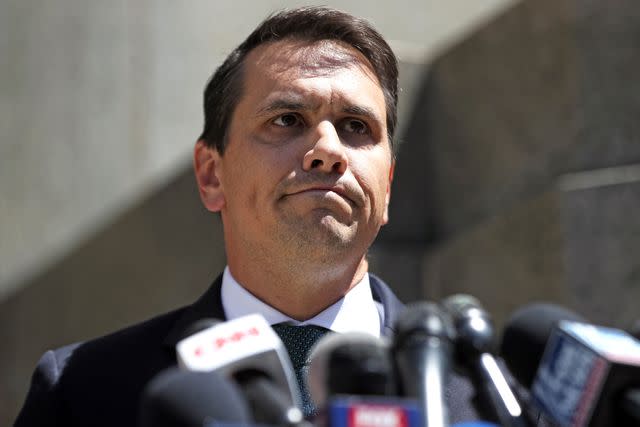
Don't Forget the Peremptory Challenges
On paper, you might not have a strong enough conflict to get dismissed by the judge for cause, but that doesn't mean you get a seat on the jury.
The law allows attorneys on both sides a certain number of "peremptory challenges," which are free passes to dismiss someone without providing a reason — so long as they aren't using their challenge to discriminate on the basis of a constitutionally protected characteristic like race or gender. ("In practice though," Polisi notes, "those challenges are often used to strike potential jurors based exactly on those constitutionally protected characteristics.")
Peremptory challenges are each side's way of having some direct input on who sits on the jury. If Trump's counsel, for example, gets the sense that one of the remaining candidates might judge the former president harshly, they can boot them from the running and the DA's office loses out on a potentially favorable juror.
Related: Every Crime Donald Trump Has Been Charged With
In Judge Merchan's jury selection instructions, he was pointed in reminding Trump's lawyers of their duty to play fair with follow-up questioning and dismissal requests, writing that "contrary to defense counsel’s arguments, the purpose of jury selection is not to determine whether a prospective juror likes or does not like one of the parties."
"Such questions are irrelevant because they do not go to the issue of the prospective juror’s qualifications," he continued. "The ultimate issue is whether the prospective juror can assure us that they will set aside any personal feelings or biases and render a decision that is based on the evidence and the law."
Related: Judge Tells Donald Trump's Attorneys to 'Control Him' as Former President Lashes Out in Court
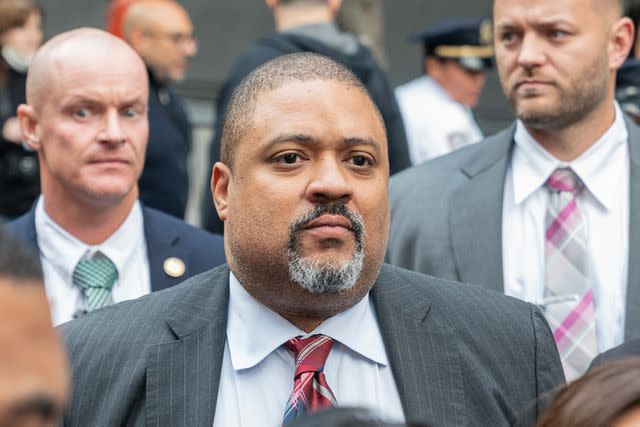
Lev Radin/Pacific Press/LightRocket via Getty
Manhattan District Attorney Alvin Bragg, who is leading the prosecution of Donald TrumpHow Long Will Jury Selection Take?
There's no defined time frame for selecting the jury, but it can't last forever.
"Jury selection can last a couple hours to several days in a typical case. This obviously is not a typical case," Ring tells PEOPLE, saying that at most, the process could last as long as two weeks. "[It] depends on a lot of factors, and the judge has a lot of control over how fast or slow the process goes."
Never miss a story — sign up for PEOPLE's free daily newsletter to stay up-to-date on the best of what PEOPLE has to offer.
Polisi agrees that it'll fall on the judge to help set the pace. "While this certainly could be a protracted exercise, I don't see Judge Merchan letting this go on much more than a week," she says.
Both Ring and Polisi believe that, in a pool of about 500 candidates, the court should be able to find its "impartial" panel when all is said and done. Once the jurors are finalized opening arguments can begin, bringing Trump one step closer to a conviction or acquittal.
For more People news, make sure to sign up for our newsletter!
Read the original article on People.

